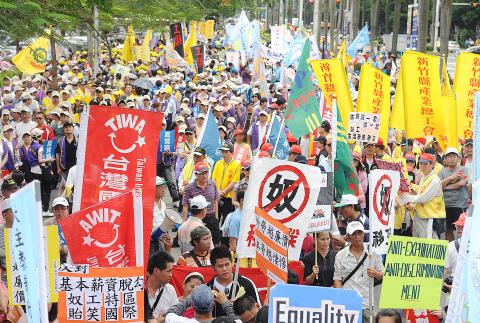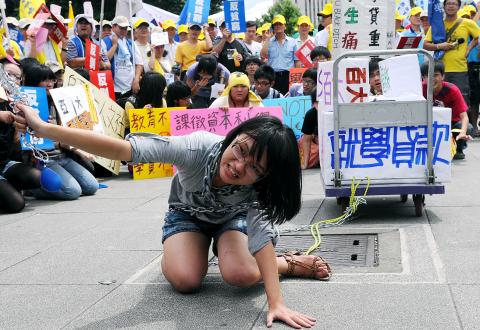More than 1,000 labor union members, activists, medical interns, nurses, migrant workers, teachers and students expressed their dissatisfaction with working conditions and the employment environment in a protest in Taipei on Workers’ Day yesterday.
Holding flags and signs outlining their demands, workers from various industries gathered at Liberty Square at noon to protest against poverty and worker exploitation.
Among a series of demands, groups called for the abolition of the responsibility system in the Labor Standards Act (勞動基準法), a reduction in the number of temporary workers and measures to protect young people’s right to work.

Photo: Liao Chen-huei, Taipei Times
Leading the parade, more than 200 nurses shouted: “We refuse to allow patients to take care of patients” and “patients can only be healthy when nurses get enough rest.”
Taiwan Radical Nurses Union member Liang Hsiu-mei (梁秀眉) said that in addition to protesting against insufficient manpower and rest hours, this year the union is emphasizing the serious problem of “freakish shift arrangements” — the unreasonable and frequent shift changes with only a few hours of rest in between, leading to exhaustion and sleep disorders.
Other protesters looked to future generations.

Photo: AFP
“We are standing out here not just for our generation, but also for our children. Many of our members’ children face difficulties in finding a stable job and often end up relying on their parents’ income,” said Yang Chun-hua (楊俊華), chief secretary of the Labor Union of the Taipei City Government’s Department of Environmental Protection.
Yang said about 20 percent of union members’ children were on student loans and about one-third of the members were still paying back credit card debt with their salary.
South Taiwan Passenger Transportation Ltd Liability Co Trade Union chairperson Chen Yun-hsiang (陳韻翔) said bus drivers were often forced to work excessive hours under poor health conditions, endangering the lives of passengers.
Holding signs that read “equality” and “minimum wage covers all workers,” foreign workers called for the same wage as local workers.
On Ketagalan Boulevard in the morning, hundreds of labor rights activists from about 30 civic groups held a protest against deteriorating labor conditions by performing sports competitions that symbolized exploitation or economic burdens faced by workers.
The “events” — a race to show that workers cannot catch up financially, weightlifting to represent the heavy economic burden on families and a pole-jumping competition to symbolize rising consumer and energy prices — highlighted the reality that the losers in the system are “guaranteed an unfair game,” said the Taiwan Labor Front, which organized the event.
Taiwan Labor Front secretary-general Son Yu-lian (孫友聯) said about one-fourth of salaried workers are unable to save more than NT$50,000 (US$1,714) a year and the majority barely make a living with their low wages.
A generation of breakdown and collapse is being created, Son said.
“Why is it that we workers only earn about 44 percent of the total income, but have to pay about 75 percent of the total income tax in Taiwan?” Alliance for Fair Tax Reform convener Wang Jung-chang (王榮璋) said, adding that the government was lying to the public with its promises of imposing a tax on the rich.
“The Executive Yuan recently announced it would raise the stock income tax threshold from NT$3 million, as initially proposed, to NT$4 million, but the income tax deduction for workers is only about NT$104,000,” Wang said.
Near the end of the rally, the activists pasted pieces of paper that read “poverty,” “exhaustion,” “blind,” “debt” and other characters on a large board decorated with a printout of President Ma Ying-jeou’s (馬英九) Facebook page.

INVESTIGATION: The case is the latest instance of a DPP figure being implicated in an espionage network accused of allegedly leaking information to Chinese intelligence Democratic Progressive Party (DPP) member Ho Jen-chieh (何仁傑) was detained and held incommunicado yesterday on suspicion of spying for China during his tenure as assistant to then-minister of foreign affairs Joseph Wu (吳釗燮). The Taipei District Prosecutors’ Office said Ho was implicated during its investigation into alleged spying activities by former Presidential Office consultant Wu Shang-yu (吳尚雨). Prosecutors said there is reason to believe Ho breached the National Security Act (國家安全法) by leaking classified Ministry of Foreign Affairs information to Chinese intelligence. Following interrogation, prosecutors petitioned the Taipei District Court to detain Ho, citing concerns over potential collusion or tampering of evidence. The

‘FORM OF PROTEST’: The German Institute Taipei said it was ‘shocked’ to see Nazi symbolism used in connection with political aims as it condemned the incident Sung Chien-liang (宋建樑), who led efforts to recall Democratic Progressive Party (DPP) Legislator Lee Kun-cheng (李坤城), was released on bail of NT$80,000 yesterday amid an outcry over a Nazi armband he wore to questioning the night before. Sung arrived at the New Taipei City District Prosecutors’ Office for questioning in a recall petition forgery case on Tuesday night wearing a red armband bearing a swastika, carrying a copy of Adolf Hitler’s Mein Kampf and giving a Nazi salute. Sung left the building at 1:15am without the armband and apparently covering the book with a coat. This is a serious international scandal and Chinese

Seventy percent of middle and elementary schools now conduct English classes entirely in English, the Ministry of Education said, as it encourages schools nationwide to adopt this practice Minister of Education (MOE) Cheng Ying-yao (鄭英耀) is scheduled to present a report on the government’s bilingual education policy to the Legislative Yuan’s Education and Culture Committee today. The report would outline strategies aimed at expanding access to education, reducing regional disparities and improving talent cultivation. Implementation of bilingual education policies has varied across local governments, occasionally drawing public criticism. For example, some schools have required teachers of non-English subjects to pass English proficiency

TRADE: The premier pledged safeguards on ‘Made in Taiwan’ labeling, anti-dumping measures and stricter export controls to strengthen its position in trade talks Products labeled “made in Taiwan” must be genuinely made in Taiwan, Premier Cho Jung-tai (卓榮泰) said yesterday, vowing to enforce strict safeguards against “origin laundering” and initiate anti-dumping investigations to prevent China dumping its products in Taiwan. Cho made the remarks in a discussion session with representatives from industries in Kaohsiung. In response to the US government’s recent announcement of “reciprocal” tariffs on its trading partners, President William Lai (賴清德) and Cho last week began a series of consultations with industry leaders nationwide to gather feedback and address concerns. Taiwanese and US officials held a videoconference on Friday evening to discuss the